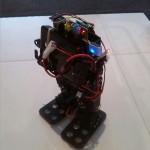
Here is the code! Go get it, Luigi! Orignal work by John Harrison that the following code was based on: http://cratel.wichita.edu/blogs/engr101fall2010/2010/11/29/2-voices-simultaneously-on-1-arduino/
// 2 voices on 1 Arduino
// demo by John Harrison
// Nov 28, 2011
// public domain
// Modified by Dipto Pratyaksa
// Added Mario tunes by Dipto Pratyaksa
// Apr 3, 2013
// v 1.1
// for the demo to work unmodified, hook up a 1Kish resistor to pin 11 and a 1Kish resistor to pin 12.
// tie the other ends of the resistors together and hook those up to an amp and speaker.
// or you could skip the resistors and hook up pin 11 to one side of a stereo amp and pin 12 to the other side
// You have to include pitches.h in the same folder as your .ino or .pde skecth file
#include "pitches.h"
// as stated above,
// connect amp/speaker to FIRST_TONE_PIN and subsequent.
// for example, if FIRST_TONE_PIN is 8 and NUM_OF_VOICE is 2,
// connect amp/speaker to arduino pin 8 and pin 9.
// if using the same amp/speaker for both pins, have each
// pin go through a 1Kish resistor before being summed together
#define FIRST_TONE_PIN 8
#define NUM_OF_VOICES 2
#define LED_PIN 13
// a future version will support more than 2 simultaneous voices
// notes in the melody:
int melody1[] = {
NOTE_E7, NOTE_E7,0,NOTE_E7,
0, NOTE_C7, NOTE_E7,0,
NOTE_G7,0,0,0,
NOTE_G6,0,0,0,
NOTE_C7, 0, 0,NOTE_G6,
0, 0,NOTE_E6,0,
0, NOTE_A6, 0, NOTE_B6,
0, NOTE_AS6, NOTE_A6, 0,
NOTE_G7, NOTE_E7, NOTE_G7,
NOTE_A7, 0, NOTE_F7, NOTE_G7,
0, NOTE_E7, 0,NOTE_C7,
NOTE_D7, NOTE_B6, 0,0,
NOTE_C7, 0, 0,NOTE_G6,
0, 0,NOTE_E6,0,
0, NOTE_A6, 0, NOTE_B6,
0, NOTE_AS6, NOTE_A6, 0,
NOTE_G7, NOTE_E7, NOTE_G7,
NOTE_A7, 0, NOTE_F7, NOTE_G7,
0, NOTE_E7, 0,NOTE_C7,
NOTE_D7, NOTE_B6, 0,0,
};
int harmony1[] = {
NOTE_FS6, NOTE_FS6,0,NOTE_FS6,
0, NOTE_FS6, NOTE_FS6,0,
NOTE_B6,0,0,0,
NOTE_G6,0,0,0,
NOTE_E6, 0, 0,NOTE_C6,
0, 0,NOTE_G5,0,
0, NOTE_C6, 0, NOTE_D6,
0, NOTE_CS6, NOTE_C6, 0,
NOTE_C6, NOTE_G6, NOTE_B6,
NOTE_C7, 0, NOTE_A6, NOTE_B6,
0, NOTE_A6, 0,NOTE_E6,
NOTE_F6, NOTE_D6, 0,0,
NOTE_E6, 0, 0,NOTE_C6,
0, 0,NOTE_G5,0,
0, NOTE_C6, 0, NOTE_D6,
0, NOTE_CS6, NOTE_C6, 0,
NOTE_C6, NOTE_G6, NOTE_B6,
NOTE_C7, 0, NOTE_A6, NOTE_B6,
0, NOTE_A6, 0,NOTE_E6,
NOTE_F6, NOTE_D6, 0,0,
};
int underworld_melody[] = {
NOTE_C5, NOTE_C6, NOTE_A4, NOTE_A5,
NOTE_AS4, NOTE_AS5, 0,
0,
NOTE_C5, NOTE_C6, NOTE_A4, NOTE_A5,
NOTE_AS4, NOTE_AS5, 0,
0,
NOTE_F4, NOTE_F5, NOTE_D4, NOTE_D5,
NOTE_DS4, NOTE_DS5, 0,
0,
NOTE_F4, NOTE_F5, NOTE_D4, NOTE_D5,
NOTE_DS4, NOTE_DS5, 0,
0, NOTE_DS5, NOTE_D5, NOTE_CS5,
NOTE_C5, NOTE_DS5,
NOTE_DS5, NOTE_GS4,
NOTE_G4, NOTE_CS5,
NOTE_C5, NOTE_FS5,NOTE_F5, NOTE_E4, NOTE_AS5, NOTE_A5,
NOTE_GS5, NOTE_DS5, NOTE_B4,
NOTE_AS4, NOTE_A4, NOTE_GS4,
0, 0, 0
};
int underworld_melody1[] = {
NOTE_C4, NOTE_C5, NOTE_A3, NOTE_A4,
NOTE_AS3, NOTE_AS4, 0,
0,
NOTE_C4, NOTE_C5, NOTE_A3, NOTE_A4,
NOTE_AS3, NOTE_AS4, 0,
0,
NOTE_F3, NOTE_F4, NOTE_D3, NOTE_D4,
NOTE_DS3, NOTE_DS4, 0,
0,
NOTE_F3, NOTE_F4, NOTE_D3, NOTE_D4,
NOTE_DS3, NOTE_DS4, 0,
0, NOTE_DS4, NOTE_D4, NOTE_CS4,
NOTE_C4, NOTE_DS4,
NOTE_DS4, NOTE_GS3,
NOTE_G3, NOTE_CS4,
NOTE_C4, NOTE_FS4,NOTE_F4, NOTE_E3, NOTE_AS4, NOTE_A4,
NOTE_GS4, NOTE_DS4, NOTE_B3,
NOTE_AS3, NOTE_A3, NOTE_GS3,
0, 0, 0
};
//melody notes in miliseconds
int underworld_tempo[] = {
200, 200, 200, 200,
200, 200, 400,
800,
200, 200, 200, 200,
200, 200, 400,
800,
200, 200, 200, 200,
200, 200, 400,
800,
200, 200, 200, 200,
200, 200, 400,
400, 133, 133, 133,
400, 400,
400, 400,
400, 400,
133, 133, 133,133, 133, 133,
267, 267, 267,
267, 267, 267,
800, 800, 800
};
int mel1Durations[] = {
150, 150, 150,150,
150, 150, 150,150,
150, 150,150,150,
150, 150,150,150,
150, 150,150,150,
150, 150,150,150,
150, 150, 150,150,
150, 150, 150,150,
200, 200, 200,
150, 150,150,150,
150, 150, 150,150,
150, 150, 150,150,
150, 150, 150,150,
150, 150, 150,150,
150, 150, 150,150,
150, 150, 150,150,
200, 200, 200,
150, 150, 150,150,
150, 150, 150,150,
150, 150, 150,150,
};
int harm1Durations[] = {
150, 150, 150,150,
150, 150, 150,150,
150, 150, 150,150,
150, 150, 150,150,
150, 150, 150,150,
150, 150, 150,150,
150, 150, 150,150,
150, 150, 150,150,
150, 150, 150,150,
150, 150, 150,150,
150, 150, 150,150,
150, 150, 150,150,
150, 150, 150,150,
150, 150, 150,150,
150, 150, 150,150,
150, 150, 150,150,
150, 150, 150,150,
150, 150, 150,150,
150, 150, 150,150,
150, 150, 150,150,
};
void setup() {
Serial.println("play");
Serial.begin(9600);
for (unsigned char i = 0; i < NUM_OF_VOICES; i++) {
pinMode(i+FIRST_TONE_PIN,OUTPUT);
Serial.println(i);
}
//led indicator
pinMode(LED_PIN,OUTPUT);
Serial.println("play");
}
void loop() {
// if we get here, we played the melody
// all we can do is pee in corner of circular room
// OPTIONAL. in this test example, the harmony and the melody are initially the same
// so we raise the harmony up an octave and slow it down to 1/2 speed
//for (int j = 0; j < (sizeof(harmony1) / sizeof(int)); j++) {
// harmony1[j] = harmony1[j] *2;
// harm1Durations[j] = harm1Durations[j] * 2;
// Serial.println(harmony1[j]);
//}
//for (int j = 0; j < (sizeof(melody1) / sizeof(int)); j++) {
// melody1[j] = melody1[j] *2;
// mel1Durations[j] = mel1Durations[j] * 2;
// Serial.println(melody1[j]);
//}
// call magic function to play both voices
playTune(melody1, sizeof(melody1)/sizeof(int), mel1Durations, harmony1, sizeof(harmony1)/sizeof(int), mel1Durations);
playTune(underworld_melody, sizeof(underworld_melody)/sizeof(int), underworld_tempo, underworld_melody1, sizeof(underworld_melody1)/sizeof(int), underworld_tempo);
}
// no need to modify anything below for basic use
void playTune(int melody[], int melLength, int melDurations[], int harmony[], int harmLength, int harmDurations[])
{
unsigned int Counts[] = { 0, 0};
unsigned int Periods[] = { 0, 0};
unsigned char States[] = { 0, 0};
unsigned long stopTimeNote1 = 0;
unsigned long stopTimeNote2 = 0;
unsigned char TimedPin = 0;
unsigned int CurrentCount = 0;
unsigned char i;
unsigned char indexMel = 0, indexHarm = 0;
while (1) {
CurrentCount = Counts[0];
TimedPin = 0;
for (i=1;i<NUM_OF_VOICES;i++) {
if (Counts[i] < CurrentCount) {
TimedPin = i;
CurrentCount = Counts[i];
} // for
}
if (CurrentCount > 3)
delayMicroseconds(CurrentCount);
if (Periods[TimedPin] < 65535)
States[TimedPin] = !States[TimedPin];
digitalWrite(LED_PIN, HIGH);
digitalWrite(FIRST_TONE_PIN+TimedPin,States[TimedPin]);
digitalWrite(LED_PIN, LOW);
if (millis() >= stopTimeNote1) {
if (indexMel >= melLength)
break;
stopTimeNote1 = millis() + melDurations[indexMel];
Periods[0] = 1000000 / melody[indexMel++];
}
if (millis() >= stopTimeNote2) {
if (indexHarm >= harmLength)
break;
stopTimeNote2 = millis() + harmDurations[indexHarm];
Periods[1] = 1000000 / harmony[indexHarm++];
}
for (i = 0; i < NUM_OF_VOICES; i++) {
Counts[i] = Counts[i] - CurrentCount;
}
Counts[TimedPin] = Periods[TimedPin];
}
}
(Visited 5,304 times, 1 visits today)
8 thoughts on “Play Mario Bros theme song on Arduino and 2 piezo buzzer / speakers in Stereo Harmonies”
Comments are closed.


this is bad ass ! wonderful demonstration.
Thank you Andre!
Have you tried programming any other theme songs that you can share with us in LinuxCircle?
yes. I did make a little gamebox, with 4 games, I used yours for one and I made “Impossible Mission” myself. I also did it with one speaker using two digital outs plus I changed the play tone function to work while other code is executed. I would like to contribute and share, where should I put the source ?
Hi Andre,
I have created a contributor account for you, so you can write and publish the article here. Please check your email for your username and password.
Thanks for sharing!
Hy Dipto,
It may take a few days till I will contribute a working / compiling stand alone version, as it is part of my “game engine”. But I´m looking forward to make it as fast as possible. Thanks for the account.
Hi Am new to Arduino Uno..can you please share the pin diagram with components.?
Here it is:
http://www.princetronics.com/wp-content/uploads/2014/06/buzzeruno.jpg
Thank you sir